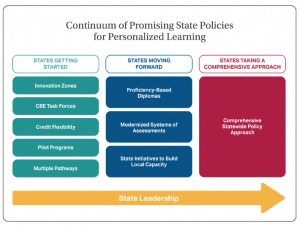New Resource: State Policy & K-12 Competency-Based Education
CompetencyWorks Blog
iNACOL released a new issue brief today: State Policy & K-12 Competency-Based Education. It’s a quick read on why the traditional system is a barrier to us reaching a vision of an excellent and equitable system, what strategies states are using to advance competency education, and how to take advantage of ESSA. From what I understand, it doesn’t look like states are taking full advantage of ESSA, so I’m going to reprint that section from the brief here.
STATES MOVING FORWARD: STATE-LED STRATEGIES TO ACCELERATE SYSTEMS TRANSFORMATION
For states moving toward broader systems change, policymakers could establish policies on proficiency-based diplomas, which require students to demonstrate mastery of academic content standards before graduating. While not inherently competency-based (particularly if implemented as solely “credit by exam”), proficiency-based diplomas can encourage the adoption of personalized, competency-based learning by stipulating that graduation decisions be based on students demonstrating mastery of college- and career-ready standards, rather than on seat-time credits.
The Every Student Succeeds Act (ESSA) provides additional space for states to redesign their systems of assessments to better support student-centered learning. Balanced, innovative systems of assessments can empower educators, students and other stakeholders with multiple forms of evidence and timely feedback on student growth, readiness, depth of learning and mastery of competencies. In competency-based education, assessment is a positive experience for students because it is part of the learning process. Innovative systems of assessments incorporate formative, interim and summative measures and forms of evidence of student work.
ESSA allows for states to consider innovative assessment pilots with a smaller number of districts to help support competency-based education. State leaders could partner with districts and schools participating in the pilot that are beginning to lead the way to competency-based learning.
ESSA also gives states the space to rethink accountability through multiple measures, continuous improvement and reciprocal accountability. States have the opportunity to move from top-down accountability models that base high-stakes decisions on a single indicator of grade-level proficiency, to next generation accountability models that drive toward student mastery of a more meaningful definition of student success aligned to the knowledge and skills students truly need to succeed in college, career and civic society.
As states begin to implement their ESSA plans, they may go back to the U.S. Department of Education for permission to amend their state plans. States can use the amendment process to continuously improve state systems of assessments and accountability to better meet the goals of equitable education systems that help all students succeed.
See also:
